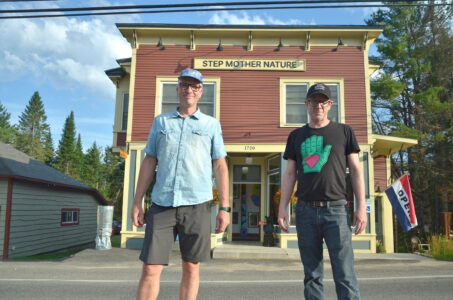Emily Martz emphasizes small business, health care in Congress run

Democratic congressional candidate turned Senate candidate Emily Martz speaks at a forum in August 2017. (Enterprise photo — Antonio Olivero)
(Editor’s note: This is part of a series of profiles of the many candidates running to represent New York’s 21st Congressional District.)
SARANAC LAKE — To Emily Martz, this year’s congressional race is all about priorities, and how hers differ from those of Congress.
The candidate from Saranac Lake — one of seven Democrats running against incumbent Rep. Elise Stefanik, R-Willsboro — said the two main priorities of the current Congress are to give tax breaks to the wealthy and dismantle the health care system, while she is focused on positive ways to improve lives and the economy in the North Country, which makes up New York’s 21st Congressional District.
“The reason I’m doing this is because I want to live in a just world,” Martz said. “When I say that, I mean that everybody has the chance to realize their full potential.”
Martz’s list of priorities include funding health care access, funding quality health care and creating incentives for the clean energy industry.
Though the 45-year-old spent years on the West Coast selling life insurance, she has been politically minded for decades. She sat on the council of student affairs in college and drove around with failed brakes to pick up shut-ins’ ballots for one of Maine state Sen. John Baldacci’s campaigns — she had to use her emergency brake to stop. More recently she has worked to connect government and private services through the Adirondack North Country Association.
She said she was fortunate enough to find a successful career, see the world and now to sustain herself while she runs her campaign full-time.
Martz grew up in Vermont and moved to the North Country without a job or a plan, just to be in the Adirondacks again, where her family would come on vacation. After substitute teaching for a while in Tupper Lake schools and teaching at Paul Smith’s College, she started work at ANCA in 2014.
As a deputy director at ANCA, Martz played a part in organizing the design, finances and execution of many of the association’s programs, from solar and biomass power to farms and artisans.
She said working at the community development organization to improve local economies and support fledgling industries gave her the skills and experience needed to do the same in Congress.
–
Communicating, compromising
–
Not one to shy away from disagreement, Martz actually seeks it out, something she said Stefanik has not done.
When Clinton Hostetter, a dairy farmer from Lowville, disagreed with Martz’s position on raising the minimum wage on Facebook, she continued the debate, and the two ended up meeting in person at Hostetter’s farm with several other farmers.
“When you don’t understand someone, you tend to fear, and you can’t understand unless you communicate,” Martz said. “I would not want to be part of any movement that is obstructionist.”
The word “compromise,” she said, has been unfairly considered a bad word in politics.
Martz said she was glad to learn more about others’ views on the wage debate and posted on her campaign Facebook page, “Visiting with them gave me a fuller perspective on why immigration reform is important: they play by the rules, and it makes sense that all employers should.”
She said there are two facts everyone needs to know about immigration: that the U.S. immigration system is broken, and that the U.S. needs immigration.
She is against building a southern border wall and supports accepting refugees, but said the country needs a carefully vetted system that checks in on people overstaying visas. With an aging population and declining birth rate, Martz said America needs more workers from a variety of skill levels, and needs a dairy farming visa system.
“There are people who are illegal who are working on the dairy farms. There are not Americans stepping up to take those jobs,” Martz said. “If it weren’t for the H-1 visas, we could not run our economy in the summer.”
She said federal bills often have provisions and regulations that make sense for larger communities but cause unnecessary hassles for smaller communities. Speaking with residents of the district, she said, would allow her to see when regulations go too far and eliminate hurdles for small businesses and start-ups before they exist.
–
Energy and economy
–
At ANCA Martz worked on several clean energy projects, and she believes it can be a catalyst for economic development, job creation and industry growth in the North Country.
“We realized a few years ago that the community members were saying, ‘We want solar,’ and we were hearing from solar distribution companies that they were struggling. … That’s a mismatch in the market,” Martz said. “You have demand, you have supply, and sometimes you need an intermediary to bring them together.”
ANCA’s Solarize program helped businesses and individuals afford solar installations.
Another place where a public-private partnership was utilized was in connecting farmers looking for new markets with schools looking for fresh food.
Martz said she wants to increase incentives for solar installation and make incentives for one type of clean energy available for all types. She also said she wants to work with community banks to organize locally based loans for energy efficiency upgrades and energy companies looking for capital to get off the ground. This would double the local benefit in her eyes.
Martz believes it is hypocritical for people who claim to support capitalism to want the government to hand out subsidies to coal companies.
“If we had a truly free market, coal would be eaten alive by competition,” Martz said.
She believes the American government should fund the services its citizens rely on instead of propping up industries in hopes of maintaining jobs and services. If these funds were allocated differently, she said there would actually be a rise in job opportunities.
Using health care as an example, she said cutting Medicaid on a federal level means states and New York counties now feel the responsibility to provide the service for their neighbors, putting a larger burden on them. With more federal funding, she said, counties would have to spend less, meaning local businesses would have to pay less taxes, resulting in more wealth and growth for businesses owners
Martz wants to sit on the House Appropriations Committee, which plays a role in deciding where funds go. She also wants to sit on the Armed Services Committee to represent Fort Drum, the largest employer in the district, as well as the National Resources Committee.




